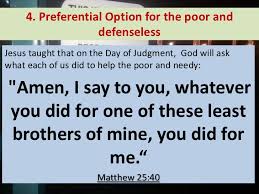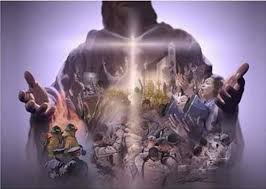
Twenty-Sixth Sunday in Ordinary Time – Year C
– 25th September 2022 –
Gospel Text: Luke 16:19-31
vs.19 Jesus said to the Pharisees:
“There was a rich man who used to dress in purple and fine linen and feast magnificently every day.
vs.20 And at his gate there lay a poor man called Lazarus, covered with sores,
vs.21 who longed to fill himself with the scraps that fell from the rich man’s table. Dogs even came and licked his sores.
vs.22 Now the poor man died and was carried away by the angels to the bosom of Abraham. The rich man also died and was buried.
 vs.23 In his torment in Hades he looked up and saw Abraham a long way off with Lazarus in his bosom.
vs.23 In his torment in Hades he looked up and saw Abraham a long way off with Lazarus in his bosom.
vs.24 So he cried out, ‘Father Abraham, pity me and send Lazarus to dip the tip of his finger in water and cool my tongue, for I am in agony in these flames.’
vs.25 ‘My son,’ Abraham replied ‘remember that during your life good things came your way, just as bad things came the way of Lazarus. Now he is being comforted here while you are in agony.
vs.26 But that is not all: between us and you a great gulf has been fixed, to stop anyone if he wanted to, crossing from our side to yours, and to stop any crossing from your side to ours.’
vs.27 The rich man replied, ‘Father, I beg you then to send Lazarus to my father’s house,
vs.28 since I have five brothers, to give them warning so that they do not come to this place of torment too.’
vs.29 ‘They have Moses and the prophets,’ said Abraham ‘let them listen to them.’
vs.30 ‘Ah no, father Abraham,’ said the rich man ‘but if someone comes to them from the dead, they will repent.’
vs.31 Then Abraham said to him,
‘If they will not listen either to Moses or to the prophets, they will not be convinced even if someone should rise from the dead.'”
************************************************
We have four commentators available from whom you may wish to choose.
Michel DeVerteuil : Michel, a Holy Ghost Priest, fmr director of the Centre of Biblical renewal in Trinidad W.I..
Thomas O’Loughlin: Thomas is on the theology faculty of Nottingham University
Sean Goan:Sean studied scripture in Rome, Jerusalem and Chicago and teaches at Blackrock College and works with Le Chéile shoools.
Donal Neary SJ: Donal is editor of The Sacred Heart Messenger *********************************************************************
Michel DeVerteuil
Lectio Divina The Year of Luke
www.columba.ie
General Textual comments
This Sunday’s passage is entirely taken up with one parable. It is in three sections – each one is a story in itself, so you can remain with any one of them:
– verses 19 to 22: an introductory scene ending with the death of both Lazarus and the rich man;
– verses 23 to 26: a first dialogue between the rich man and Abraham;
– verses 27 to 31: a second dialogue between them.
All but one of the Sunday gospel passages for the next few weeks include a parable. It is therefore good to remember the special kind of teaching that a parable is, a kind of teaching that is not common in our culture.
We are accustomed to moralizing stories, in which the point of the story is to exhort us to imitate the hero or heroine. A parable is not meant to work like that. Its method is to evoke a personal response to the story: what a surprise that was! or, what an unexpected ending! Then it says to us: remember an experience like that and you will know what happens when God comes into people’s lives.
As in every story, you must find yourself identifying with one of the characters; for example, in this parable there are three characters – the rich man, Lazarus, and Abraham.
A reminder for this parable: all Bible meditation must start from experience. Therefore do not read this parable first of all as something that happened in the next life, because you have no experience of that. The parable may well lead you to conclude something about the next life, but you mustn’t start there.
Scriptural Reflections
Lord, there are times when we feel very lonely,
ignored by everyone,
as if we were at the gate of a very wealthy man,
longing to fill ourselves with scraps from his table.
But you lead us from there to an experience of security :
– a moment of deep prayer;
– we feel loved by our family;
– we find ourselves in a group which shares our values.
– We feel as if we had been gathered into the bosom of our ancestors,
safe from all those who would send us here and there for their own purposes,
as safe as if a great gulf had been fixed between us
to stop anyone who wanted to from crossing from our side to theirs,
and to stop anyone crossing from their side to ours.
Thank you, Lord.
 Lord, remorse is a terrible thing.
Lord, remorse is a terrible thing.
It is being in agony in flames of fire,
seeing those we have wronged a long way off,
longing to have them dip their finger in water
and cool our tongue, and finding that between us and them a great gulf has been fixed
to stop any crossing from their side to ours.
Preserve us, Lord.
Lord, we pray for parents today,
that they may teach right values to their children,
teaching them not to set their hearts on purple clothes and fine linen
nor on feasting magnificently every day,
because these things die and are buried,
but to reverence poor people because one day they will be carried
away by angels to the bosom of Abraham.
“We must build a world where freedom is not an empty word
and where the poor man Lazarus can sit down at the same table with the rich man.”…Pope Paul VI
Lord, when we look around at the world today, what do we see?
Rich nations dressed in purple and fine linen,
feasting magnificently every day,
while at their very gates lie poor nations,
covered with sores and longing to fill themselves
with scraps from the tables of the rich,
dogs even come and lick their sores.
Lord, we pray that your Church may continue to call the world
to repentance as Jesus did.
“The moment we cease to hold each other, the moment we break faith with one another,
the sea engulfs us and the light goes out.” …James Baldwin
Lord, whenever the time comes
that rich people dress in purple and fine linen
and feast magnificently every day,
while the poor lie at their gates unattended,
their only future is to die and be buried.
*****************************************
Thomas O’Loughlin,
Liturgical Resources for the Year of Luke
www.Columba.ie
Homily notes
1. Hearing our basic stories together is one of the key ways that we are formed within communities; and as a community of faith this is a key way through which we remain in union with the teaching of the Christ. These are the two basic reasons why we have them read to us at our Sunday gatherings. The telling and retelling of our sacred texts forms us into the body of Christ, and for this reason we say that one of the modes of Christ’s real presence in the assembly is in the readings.
However, this presence is all too easily obscured. This happens when, for example, a group all want to read the text as individuals from their own books rather than to listen to the text as a group. When this happens — and it is no longer confined to Reformation groups who explicitly adopt an individualist approach to the scriptures – the liturgical hearing of our inheritance of stories is more like many people sitting in a library all engaged in their own business, rather than an audience at a play where they react together in sadness, in sympathy or in joy.
Another way that the presence is obscured is when there are too many words or pieces of text that require assistance to make them clear or even comprehensible. A story that is too complex to its hearers is one that does not really create the common memories that make us one people. Therefore, actualising the presence of Christ in the Liturgy of the Word is one of the most difficult tasks than any president of the Eucharist faces today. But there are occasions when this challenge is far easier to meet; and this Sunday is one of those occasions.
 2. The combination of the first reading and the gospel pick out for us that the message of these readings is the Lord’s preferential option for the poor (and not, for example, the structure of judgement or the cosmology of hell – two themes for which this gospel has often been used in the past). And this theme is not only one that is central to the whole message of the Christ, but also one which is comprehensible because it touches some of our basic instincts. The proof that it is comprehensible can be found in the vehemence with which those with vested interests in making easy money at the expense of the poor turned their firepower on the proponents of Liberation Theology – how many other movements in theology can you think of that have generated such well-financed opposition?
2. The combination of the first reading and the gospel pick out for us that the message of these readings is the Lord’s preferential option for the poor (and not, for example, the structure of judgement or the cosmology of hell – two themes for which this gospel has often been used in the past). And this theme is not only one that is central to the whole message of the Christ, but also one which is comprehensible because it touches some of our basic instincts. The proof that it is comprehensible can be found in the vehemence with which those with vested interests in making easy money at the expense of the poor turned their firepower on the proponents of Liberation Theology – how many other movements in theology can you think of that have generated such well-financed opposition?
Moreover, in the whole of the gospels (the infancy and passion narratives apart) there is probably no more memorable a story by Jesus: we can picture ‘the rich man’; we can picture hungry Lazarus with his sores being licked by the dogs; we can imagine the flames and the cooling sip of water; and we can imagine ‘being in torment’. To hear this story is to enrich one’s imagination.
3. So today is a day to let these two readings seep into the imagination and contribute to the formation of a community of memory. How does one do this?
a) Omit the second reading as a distracting interlude to the theme.
b) Do not preach a homily, but call for a time of silent reflection: two minutes is usually enough.
c) Ensure that people listen to the two readings: so remove the missalettes and ‘Mass books’.
d) Make sure that the reader of the first reading appreciates the plan for the liturgy today and reads each ‘woe’ distinctly as something that each of us can take on board as a basic idea.
e) Read the gospel with special solemnity: procession with book, an escort of lights, and with incense.
f) Read it out as if telling a story. Some translations are much better for this than others; but, on the whole, the suitability of any translation for capturing the storytelling tone of the original will depend on how it interacts with your own story telling style. And our individual story telling styles are as distinctive as our mannerisms, so you may have to experiment with several translations. Below you will see how I have adapted the RSV translation to suit my own style:
A reading from the Holy Gospel according to Luke.
As they travelled as a group along the road towards Jerusalem, Jesus told this story to his disciples:
Once upon a time there was a rich man. He wore the most expensive of clothes, the finest linen was used to make his shirts, and every day he feasted sumptuously on the best of food.
Outside his house, at his gate, lay a poor man named Lazarus, covered in sores. Lazarus was indeed so hungry that he would have been happy to be fed with whatever fell from the rich man’s table. There Lazarus lay, day after day, and the dogs who came and licked his sores were his only comfort.
The poor man died and was carried by the angels to Abraham’s bosom.
The rich man also died and was buried.
 Then being held in the place of the dead, the rich man, now living in torment, lifted up his eyes, and saw Abraham far off and Lazarus in his bosom. He then called out:
Then being held in the place of the dead, the rich man, now living in torment, lifted up his eyes, and saw Abraham far off and Lazarus in his bosom. He then called out:
Father Abraham, have mercy upon me, and send Lazarus to dip the end of his finger in water and cool my tongue; for I am in anguish in this flame.
But Abraham answered him saying:
Son, remember that you in your lifetime received your good things, and, at the same time, Lazarus only received suffering.
But now, Lazarus is comforted here, and you are in anguish.
And, in any case, between us and you a great gulf has been fixed, in order that no one might pass from here to where you are, and no one may cross from where you are to our side.
So the rich man then said to Abraham:
Then I beg you, father, to send Lazarus to my father’s house, because I have five brothers and I want Lazarus to warn them, because I do not want my brothers also to come into this place of torment.
But Abraham answered this petition by saying:
Your brothers have Moses and the prophets; let them listen to them.
But the rich man then said:
No, father Abraham, that would not be enough for them to learn the truth that they must change the way they live their lives; but if some one goes to them from the dead, they will repent.
Then Abraham said to the rich man:
If your brothers do not hear Moses and the prophets, Then neither will they be convinced even if someone should rise from the dead.
*****************************************
Sean Goan
Let the Reader Understand
www.columba.ie
Gospel Comment
Still on the theme of the proper use of money, Jesus tells another parable this time showing, in story form, the meaning of the beatitudes in ch 6: ‘Happy you who are poor’ and ‘Woe to you who are rich.’ In the story a wealthy man is utterly unaware of the misery of the poor man who lies at his gate. When they die they find that the situation is reversed. Now it is the rich man who is in need of a mere drop of water and it is Lazarus the poor man who is happy with Abraham in heaven. The point of the story is not to promote the idea of ‘pie in the sky when you die’. It is rather an attack on the greed and selfishness in a world of plenty that leaves the poor excluded. If this was a problem in biblical times, it pales into insignificance when we consider today’s world and the scale of the misery experienced by so many. The parable retains all its force; the difference is Jesus did come back from the dead and not just to tell us about heaven but about the poor people at the gate. Are we listening?
Reflection
 It would probably be true to say that most Christians nowadays do not give much thought to the questions about the Second Coming of Jesus. However our life of faith cannot be reduced to following a set of rules. Rather our Christianity must give thought to the fact it depends on a relationship. In this way we will, like Amos, be impatient for an end to all the lifestyles and practices that run contrary to the values of the kingdom of God. Christ has died, Christ is risen, Christ will come again!
It would probably be true to say that most Christians nowadays do not give much thought to the questions about the Second Coming of Jesus. However our life of faith cannot be reduced to following a set of rules. Rather our Christianity must give thought to the fact it depends on a relationship. In this way we will, like Amos, be impatient for an end to all the lifestyles and practices that run contrary to the values of the kingdom of God. Christ has died, Christ is risen, Christ will come again!
***********************************************************
Donal Neary S.J.
Gospel reflections for Year C: Luke
www.messenger.ie/bookshop/
Faith in action: On fire with hope
This story of Jesus highlights the inequality of rich and poor. Jesus appeals to our sense of justice,, right and goodness. There is no need for anyone to come back from the dead to warn us of this inequality. The doors between rich and poor can often be locked as were the doors between Dives and Lazarus. Those outside can only knock, protest and even break down doors. The doors must be opened from the inside.
 This message of justice and hope for an equal share of the world’s goods for everyone is strong in the gospel of Jesus. His heart was on fire with the hope of a better life for the poor. He went to help them simply because they were poor.
This message of justice and hope for an equal share of the world’s goods for everyone is strong in the gospel of Jesus. His heart was on fire with the hope of a better life for the poor. He went to help them simply because they were poor.
The Christian Church, if it is to be faithful to the gospel, should be involved in many ways in the creation of a more just world. The Christian parish takes a special care for the refugee, the new poor and the old poor the unborn, the elderly, and in fact all whose voices may not be usually heard.
The parable is meant not to scare with images of punishment, but to make us as aware of the huge inequalities that exist in our world, and in the exploitation of resources in the developing world.
Maybe we can pray not to be tormented by any of the pains of this story, but be tormented into action by the hunger, poverty and injustices of our world. Maybe then more doors can be opened from the inside of wealth to the outside of poverty.
Lord, may we build with you a world of justice and peace.